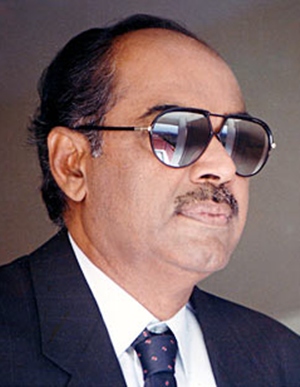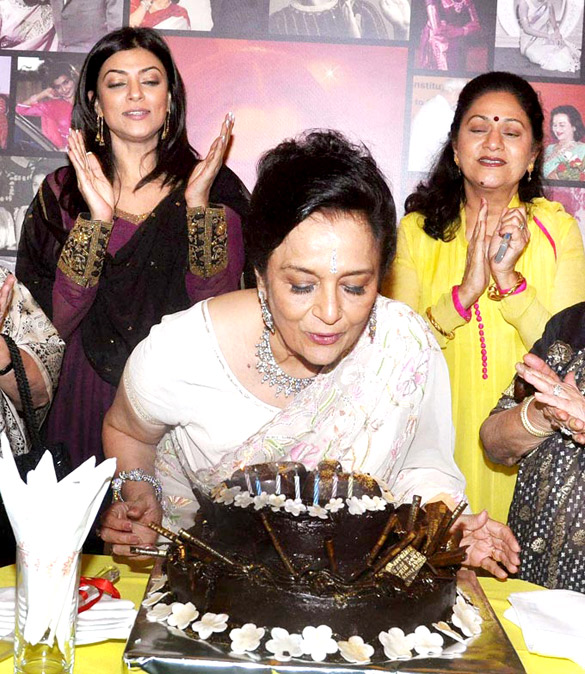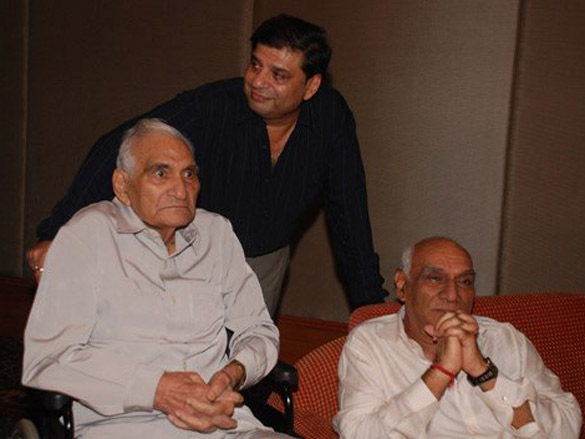|
57th National Film Awards
The 57th National Film Awards, presented by Directorate of Film Festivals, the organisation set up by Ministry of Information and Broadcasting, India to felicitate the best of Indian Cinema released in the year 2009. Three different committees were instituted in order to judge the various entries for feature film, non-feature film and best writing on cinema sections; headed by National award winner director, Ramesh Sippy, for feature films and Mike Pandey along with Samik Bandyopadhyay for non-feature films and best writing on cinema sections, respectively. Another committee of five members was also constituted for the Dadasaheb Phalke Award. Each chairperson for feature film, non-feature film and best writing on cinema sections announced the award on 15 September 2010 for their respective sections and award ceremony took place at Vigyan Bhavan, New Delhi with President of India, Pratibha Patil giving away the awards on 22 October 2010. Dadasaheb Phalke award for D. Ramanaidu ... [...More Info...] [...Related Items...] OR: [Wikipedia] [Google] [Baidu] |
Directorate Of Film Festivals
The Directorate of Film Festivals in India was an organisation that initiated and presented the International Film Festival of India, the National Film Awards and the Indian Panorama. Although the Directorate helped appoint members of the jury panels each year, it had no input on which films are selected for consideration and which films ultimately win awards at the various functions it initiates. The Directorate set up by Ministry of Information and Broadcasting, Govt of India,Directorate of Film Festivals . Ministry of Information and Broadcasting. |
Production Sound Mixer
A production sound mixer, location sound recordist, location sound engineer, or simply sound mixer is the member of a film crew or television crew responsible for recording all sound recording on set during the filmmaking or television production using professional audio equipment, for later inclusion in the finished product, or for reference to be used by the sound designer, sound effects editors, or foley artists (aka foley dancers). This requires choice and deployment of microphones, choice of recording media, and mixing of audio signals in real time. Usually, the recordist will arrive on location with their own equipment, which normally includes microphones, radio systems, booms, mixing desk, audio storage, headphones, cables, tools, and a paper or computer sound logs. The recordist may be asked to capture a wide variety of wild sound on location, and must also consider the format of the finished product (mono, stereo or multi channels). Production sound mixers are tasked with ... [...More Info...] [...Related Items...] OR: [Wikipedia] [Google] [Baidu] |
Malayalam Cinema
Malayalam cinema is an Indian film industry of Malayalam-language motion pictures. It is based in Kochi, Kerala, India. The films produced in Malayalam cinema are known for their cinematography and story-driven plots. In 1982, ''Elippathayam'' won the Sutherland Trophy at the London Film Festival, and Most Original Imaginative Film of 1982 by the British Film Institute. Rajiv Anchal's ''Guru'' (1997), Salim Ahamed's ''Adaminte Makan Abu'' (2011) and Lijo Jose Pellissery's ''Jallikkattu'' (2019) were Malayalam films sent by India as its official entries for the Best Foreign Language Film category at the Academy Awards. Other films which achieved global acclaim include ''Chemmeen'' (1965), which received a Certificate of Merit at the Chicago International Film Festival, and a gold medal at the Cannes Film Festival for Best Cinematography.. ''The Hindu''. 11 August 2006. Retrieved 24 May 2011. '' Swaham'' (1994) won the ''Bronze Rosa Camuna'' at the Bergamo Film Meeting in Italy ... [...More Info...] [...Related Items...] OR: [Wikipedia] [Google] [Baidu] |
Film Producer
A film producer is a person who oversees film production. Either employed by a production company or working independently, producers plan and coordinate various aspects of film production, such as selecting the script, coordinating writing, directing, editing, and arranging financing. The producer is responsible for finding and selecting promising material for development. Unless the film is based on an existing script, the producer hires a screenwriter and oversees the script's development. These activities culminate with the pitch, led by the producer, to secure the financial backing that enables production to begin. If all succeeds, the project is "greenlighted". The producer also supervises the pre-production, principal photography and post-production stages of filmmaking. A producer is also responsible for hiring a director for the film, as well as other key crew members. Whereas the director makes the creative decisions during the production, the producer typically ma ... [...More Info...] [...Related Items...] OR: [Wikipedia] [Google] [Baidu] |
Dadasaheb Phalke Award
The Dadasaheb Phalke Award is India's highest award in the field of cinema. It is presented annually at the National Film Awards ceremony by the Directorate of Film Festivals, an organisation set up by the Ministry of Information and Broadcasting. The recipient is honoured for their "outstanding contribution to the growth and development of Indian cinema" and is selected by a committee consisting of eminent personalities from the Indian film industry. The award comprises a ''Swarna Kamal'' (Golden Lotus) medallion, a shawl, and a cash prize of . Presented first in 1969, the award was introduced by the Government of India to commemorate Dadasaheb Phalke's contribution to Indian cinema. Phalke (1870–1944), who is popularly known as and often regarded as "the father of Indian cinema", was an Indian filmmaker who directed India's first full-length feature film, ''Raja Harishchandra'' (1913). The first recipient of the award was actress Devika Rani, who was honoured at the 17t ... [...More Info...] [...Related Items...] OR: [Wikipedia] [Google] [Baidu] |
Asha Parekh
Asha Parekh (born 2 October 1942) is a retired Indian actress, film director, and producer who appeared in many commercially successful films throughout her career. She was the highest paid actress of her time and was one of the most successful actresses of the 1960s and 1970s. She is considered one of the most influential actresses of all time in Hindi cinema. In 1992, she was honoured with the Padma Shri by the Government of India for her contribution to the field of cinema and also honoured with the Dadasaheb Phalke Award for 2020. Early life Asha Parekh is a Gujarati born on 2 October 1942. Her mother, Sudha aka Salma Parekh, was a Dawoodi Bohra Shia Gujarati Muslim and her father, Bachubhai Parekh, was Hindu Gujarati. Her mother enrolled her in Indian classical dance classes at an early age and she learned from many teachers, including Pandit Bansilal Bharati. Career Parekh started her career as a child artist under the screen name Baby Asha Parekh. Famed film director ... [...More Info...] [...Related Items...] OR: [Wikipedia] [Google] [Baidu] |
Jagjit Singh
Jagjit Singh (born Jagmohan Singh Dhiman; 8 February 1941 – 10 October 2011) was an Indian composer, singer and musician. He composed and sang in numerous languages and is credited for the revival and popularity of ghazal, an Indian classical art form, by choosing poetry that was relevant to the masses and composing them in a way that laid more emphasis on the meaning of words and melody evoked by them. In terms of Indian classical music, his style of composing and ''gayaki'' (singing) is considered as ''Bol-pradhan'', one that lays emphasis on words. He highlighted this in his music for films such as '' Prem Geet'' (1981), ''Arth (1982)'', and '' ''Saath Saath'''' (1982), and TV serials ''Mirza Ghalib'' (1988) and '' Kahkashan'' (1991). Singh is considered to be the most successful ghazal singer and composer of all time in terms of critical acclaim and commercial success. With a career spanning five decades and many albums, the range and breadth of his work has been r ... [...More Info...] [...Related Items...] OR: [Wikipedia] [Google] [Baidu] |
Javed Akhtar
Javed Akhtar (born 17 January 1945) is an Indian poet, lyricist, screenwriter and political activist. Known for his work in Hindi cinema, he has won five National Film Awards, and received the Padma Shri in 1999 and the Padma Bhushan in 2007, two of India's highest civilian honours. Akhtar came to recognition in the duo Salim–Javed, and earned his breakthrough as a screenwriter with 1973's ''Zanjeer''. He went on to write the films ''Deewar'' and ''Sholay'', both released in 1975; they earned a cult following, and had a significant impact in popular culture. He later earned praise for his work as a lyricist, winning the National Film Award for Best Lyrics five times and the Filmfare Award for Best Lyricist eight times. Akhtar notably campaigned for the Communist Party of India (CPI) and their candidate in the 2019 Indian general election, and was a member of parliament in Rajya Sabha. For his work, he received the Richard Dawkins Award in 2020. Early life Javed Akh ... [...More Info...] [...Related Items...] OR: [Wikipedia] [Google] [Baidu] |
Akkineni Nageswara Rao
Akkineni Nageswara Rao (20 September 1923 – 22 January 2014), widely known as ANR, was an Indian actor and producer, known for his works majorly in Telugu cinema. He starred in many landmark films in his seventy five-year career, and became one of the most prominent figures of Telugu cinema. Nageswara Rao received seven state Nandi Awards, and five Filmfare Awards South. He is a recipient of the Dada Saheb Phalke Award and Padma Vibhushan, India's second highest civilian award, for his contributions to the fields of Art and Cinema. Nageswara Rao is known for his work in biographical films. He portrayed the Tamil saint Vipra Narayana in the 1954 film ''Vipra Narayana''; Telugu poet Tenali Ramakrishna in the 1956 film ''Tenali Ramakrishna'', which received the All India Certificate of Merit for Best Feature Film; the Sanskrit poet Kalidasa in the 1960 film ''Mahakavi Kalidasu''; the 12th century Sanskrit poet Jayadeva in the 1961 film ''Bhakta Jayadeva''; the legendary sculpt ... [...More Info...] [...Related Items...] OR: [Wikipedia] [Google] [Baidu] |
Yash Chopra
Yash Raj Chopra (27 September 1932 21 October 2012) was an Indian people, Indian film director and film producer who worked in Bollywood, Hindi cinema. The founding chairman of the film production and distribution company Yash Raj Films, Chopra was the recipient of several awards, including 6 National Film Awards and 8 Filmfare Awards. He is considered among the best Indian filmmakers. For his contributions to film, the Government of India honoured him with the Dadasaheb Phalke Award in 2001, and the Padma Bhushan in 2005. In 2006, British Academy of Film and Television Arts presented him with a lifetime membership, making him the first Indian to receive the honour. Chopra began his career as an assistant director to I. S. Johar and his elder brother, B.R. Chopra. He made his directorial debut with ''Dhool Ka Phool'' in 1959, a melodrama about illegitimacy, and followed it with the social drama ''Dharmputra'' (1961). Chopra rose to prominence after directing the critically and ... [...More Info...] [...Related Items...] OR: [Wikipedia] [Google] [Baidu] |
Background Music
Background music (British English: piped music) is a mode of musical performance in which the music is not intended to be a primary focus of potential listeners, but its content, character, and volume level are deliberately chosen to affect behavioral and emotional responses in humans such as concentration, relaxation, distraction, and excitement. Listeners are uniquely subject to background music with no control over its Loudness, volume and content. The range of responses created are of great variety, and even opposite, depending on numerous factors such as, setting, culture, audience, and even time of day. Background music is commonly played where there is no audience at all, such as empty hallways and restrooms and fitting rooms. It is also used in artificial space, such as music played while on hold during a telephone call, and virtual space, as in the ambient sounds or thematic Video game music, music in video games. It is typically played at low volumes from multiple small ... [...More Info...] [...Related Items...] OR: [Wikipedia] [Google] [Baidu] |






